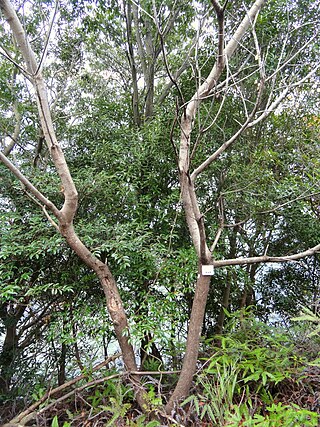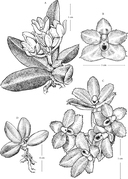
Rafflesia is a genus of parasitic flowering plants in the family Rafflesiaceae. The species have enormous flowers, the buds rising from the ground or directly from the lower stems of their host plants; one species has the largest flower in the world. Plants of the World Online lists up to 41 species from this genus, all of them are found throughout Southeast Asia.

Neuwiedia is a genus of primitive terrestrial orchids, comprising 9 species native to China, Southeast Asia and certain Pacific Islands.

Thelymitra, commonly known as sun orchids, is a genus of more than 100 species of plants in the orchid family, Orchidaceae. Unlike most other orchids, sun orchids lack a highly modified labellum and all three petals are similar in size, shape and colour. The column is, however, highly modified and usually has prominent wings or glands which are helpful in identifying the species. Most sun orchids close their flowers at night, in cloudy or cool weather, giving rise to their common name. The scientific name means "woman's hood" and refers to the hooded column present in most, but not all species. Most species are endemic to Australia although some are found as far from there as the Philippines and Indonesia. The type species, Thelymitra longifolia, the first to be formally described, was collected in New Zealand.

Lecanorchis is a genus of orchids belonging to the subfamily Vanilloideae.

Corybas, commonly known as helmet orchids, is a genus of about 120 species of plants in the orchid family, Orchidaceae. Helmet orchids are small, perennial, deciduous herbs and are nearly always terrestrial. They have a single leaf at their base and a single flower on a short stalk, the flower dominated by its large dorsal sepal and labellum. Species of Corybas are found in Australia, New Zealand, New Guinea, Southeast Asia, the Himalayas, southern China, many Pacific islands and a few sub-Antarctic islands.

Acriopsis, commonly known as chandelier orchids or 合萼兰属 is a genus of flowering plants in the family Orchidaceaes. Orchids in this genus are epiphytic herbs with spherical or cylindrical pseudobulbs, creeping, branched rhizomes, thin white roots, two or three leaves and many small flowers. The flowers are non-resupinate with the lateral sepals joined along their edges and have spreading petals and a three-lobed labellum. The column has projections that extend hood-like beyond the anther.

Gastrodia, commonly known as potato orchids, is a genus of terrestrial leafless orchids in the family Orchidaceae, about ninety of which have been described. Orchids in this genus have fleshy, upright stems and small to medium-sized resupinate flowers with narrow sepals and petals. They are native to Asia, Australia, New Zealand, central Africa, and various islands of the Indian and Pacific Oceans.

Willughbeia is a genus of plant in the family Apocynaceae, first described as a genus in 1820. It is native to Southeast Asia with a few species in the Indian Subcontinent. Several species have edible fruits enjoyed in many countries. Many species are vines with sticky latex.

Dipodium, commonly known as hyacinth orchids, is a genus of about forty species of orchids native to tropical, subtropical and temperate regions of south-east Asia, New Guinea, the Pacific Islands and Australia. It includes both terrestrial and climbing species, some with leaves and some leafless, but all with large, often colourful flowers on tall flowering stems. It is the only genus of its alliance, Dipodium.

Rhynchostylis is a genus in the orchid family (Orchidaceae), closely allied to the genus Vanda and comprising four currently accepted species native to the Indian Subcontinent, China, Indochina, Malaysia, Indonesia and the Philippines.

Trichoglottis, commonly known as cherub orchids or 毛舌兰属 , is a genus of flowering plants in the family Orchidaceae. Orchids in this genus are epiphytic plants with thick roots, relatively thick, fibrous stems and many large, thick, leathery leaves arranged in two ranks. The flowers are usually small and yellowish with light brown or purple markings. The flowers have broad sepals, narrower petals and a labellum which has three lobes and is often hairy. There are about 85 species distributed from tropical and subtropical Asia to the north-western Pacific. Most species grow in rainforest.

Parsonsia is a genus of woody vines in the family Apocynaceae. Species occur throughout Indomalaya, Australasia and Melanesia.

Pholidota, commonly known as rattlesnake orchids, is a genus of flowering plants from the orchid family, Orchidaceae. Plants in this genus are clump-forming epiphytes or lithophytes with pseudobulbs, each with a single large leaf and a large number of small, whitish flowers arranged in two ranks along a thin, wiry flowering stem that emerges from the top of the pseudobulb. There are about thirty five species native to areas from tropical and subtropical Asia to the southwestern Pacific.

Cryptostylis, commonly known as tongue orchids, is a genus of flowering plants from the orchid family. Tongue orchids are terrestrial herbs with one to a few stalked leaves at the base of the flowering stem, or leafless. One to a few dull coloured flowers are borne on an erect flowering stem. The most conspicuous part of the flower is the labellum, compared to the much reduced sepals and petals. At least some species are pollinated by wasps when they attempt to mate with the flower. There are about twenty five species found in South Asia, Southeast Asia and the South Pacific.

Thelasis, commonly known as fly orchids, is a genus of flowering plants from the orchid family, Orchidaceae. Plants in this genus are usually epiphytes, sometimes lithophytes or rarely terrestrials. Some species have pseudobulbs with up to three leaves, whilst others have several leaves in two ranks. A large number of small, white or greenish yellow flowers are borne on a thin, arching flowering stem. There are about thirty species, distributed from tropical and subtropical Asia to the southwest Pacific.

Microsaccus is a genus of flowering plants from the orchid family, Orchidaceae. It is native to Southeast Asia.

Cassia javanica, also known as Java cassia, pink shower, apple blossom tree and rainbow shower tree, is a species of tree in the family Fabaceae. Its origin is in Southeast Asia, but it has been extensively grown in tropical areas worldwide as a garden tree owing to its beautiful crimson and pink flower bunches.
Gastrodia javanica, or Javanese chijian, is an epiparasitic species of orchid native to Singapore, the Philippines, Indonesia, Malaysia, and Thailand. The species normally grows to a height of 20 to 80 centimeters, and has pale yellow or green-yellow flowers.

Brucea javanica is a shrub in the family Simaroubaceae. The specific epithet javanica is from the Latin, meaning "of Java". Other common names in English include Java brucea and kosam.

Phalaenopsis javanica is a species of orchid native to Java and Sumatra. The specific epithet javanica refers to the Indonesian island Java.























